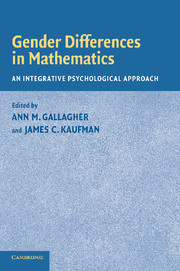Book contents
- Frontmatter
- Contents
- Preface
- Acknowledgments
- List of Contributors
- 1 Research on the Women and Mathematics Issue: A Personal Case History
- 2 The Perseverative Search for Sex Differences in Mathematics Ability
- 3 A Psychobiosocial Model: Why Females Are Sometimes Greater Than and Sometimes Less Than Males in Math Achievement
- 4 Gender Differences in Math: Cognitive Processes in an Expanded Framework
- 5 Cognitive Contributions to Sex Differences in Math Performance
- 6 Spatial Ability as a Mediator of Gender Differences on Mathematics Tests: A Biological–Environmental Framework
- 7 Examining Gender-Related Differential Item Functioning Using Insights from Psychometric and Multicontext Theory
- 8 The Gender-Gap Artifact: Women's Underperformance in Quantitative Domains Through the Lens of Stereotype Threat
- 9 “Math is hard!” (Barbie™, 1994): Responses of Threat vs. Challenge-Mediated Arousal to Stereotypes Alleging Intellectual Inferiority
- 10 The Role of Ethnicity on the Gender Gap in Mathematics
- 11 The Gender Gap in Mathematics: Merely a Step Function?
- 12 “I can, but I don't want to”: The Impact of Parents, Interests, and Activities on Gender Differences in Math
- 13 Gender Effects on Mathematics Achievement: Mediating Role of State and Trait Self-Regulation
- 14 Gender Differences in Mathematics Self-Efficacy Beliefs
- 15 Gender Differences in Mathematics: What We Know and What We Need to Know
- Author Index
- Subject Index
- References
15 - Gender Differences in Mathematics: What We Know and What We Need to Know
Published online by Cambridge University Press: 05 June 2012
- Frontmatter
- Contents
- Preface
- Acknowledgments
- List of Contributors
- 1 Research on the Women and Mathematics Issue: A Personal Case History
- 2 The Perseverative Search for Sex Differences in Mathematics Ability
- 3 A Psychobiosocial Model: Why Females Are Sometimes Greater Than and Sometimes Less Than Males in Math Achievement
- 4 Gender Differences in Math: Cognitive Processes in an Expanded Framework
- 5 Cognitive Contributions to Sex Differences in Math Performance
- 6 Spatial Ability as a Mediator of Gender Differences on Mathematics Tests: A Biological–Environmental Framework
- 7 Examining Gender-Related Differential Item Functioning Using Insights from Psychometric and Multicontext Theory
- 8 The Gender-Gap Artifact: Women's Underperformance in Quantitative Domains Through the Lens of Stereotype Threat
- 9 “Math is hard!” (Barbie™, 1994): Responses of Threat vs. Challenge-Mediated Arousal to Stereotypes Alleging Intellectual Inferiority
- 10 The Role of Ethnicity on the Gender Gap in Mathematics
- 11 The Gender Gap in Mathematics: Merely a Step Function?
- 12 “I can, but I don't want to”: The Impact of Parents, Interests, and Activities on Gender Differences in Math
- 13 Gender Effects on Mathematics Achievement: Mediating Role of State and Trait Self-Regulation
- 14 Gender Differences in Mathematics Self-Efficacy Beliefs
- 15 Gender Differences in Mathematics: What We Know and What We Need to Know
- Author Index
- Subject Index
- References
Summary
The true nature of the relationship between gender and mathematics is much more complex than most people have been led to believe. Differences are found in relatively few aspects of mathematics performance (as noted by several authors in this volume), and when they are found, their causes are varied and often elusive. Indeed, individual differences in ability and achievement within gender are probably much larger than the differences between genders.
Yet, there persists a monolithic stereotype that girls don't like math and aren't as good at it as boys. This common perception is a poor reflection of reality and is likely to discourage girls from engaging in mathematics study and thus to limit opportunities for women in mathematics and related fields. Why do data from some standardized tests of mathematics show a gender gap, while nontest data show women matching or exceeding men in the classroom? Chapters in this book explore the issue from a variety of disciplines and perspectives. Some use a cognitive processing perspective, others use the lens of social psychology, and others bring in aspects of education and environment. Taken together, these perspectives complement each other in painting a picture of how the gender gap in test performance arises despite the many areas of gender parity in performance and ability.
BACKGROUND ISSUES
Chipman's personal history of her involvement in research on gender and mathematics chronicles the factors influencing early research efforts in this area, and presents some important contemporary issues that illustrate the complexity and contradictory nature of the evidence for and against gender differences in performance and participation.
- Type
- Chapter
- Information
- Gender Differences in MathematicsAn Integrative Psychological Approach, pp. 316 - 332Publisher: Cambridge University PressPrint publication year: 2004
References
- 3
- Cited by



